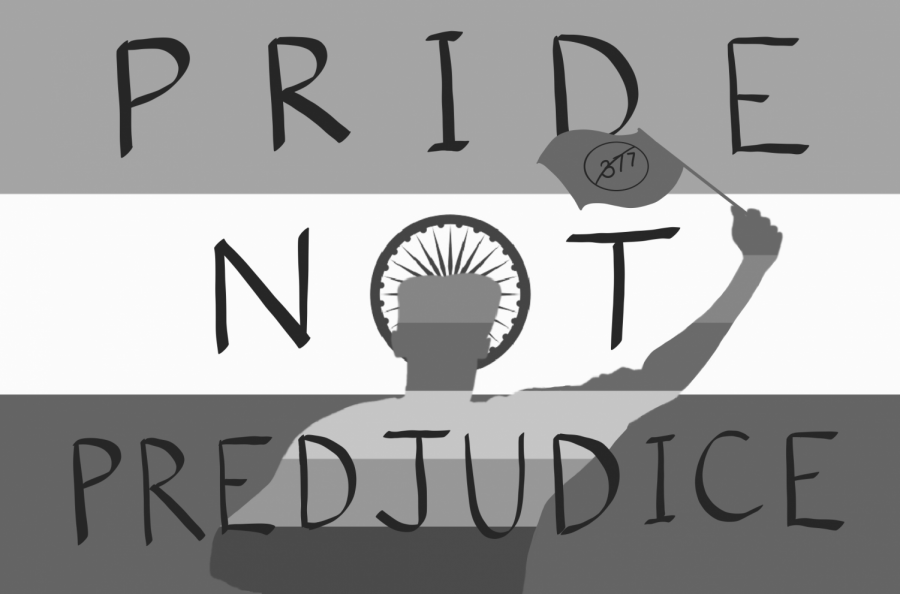India passes historic legislation allowing constitutional freedoms for gay citizens
October 17, 2018
Rainbow flags draped the streets as happy couples, surrounded by clouds of multi-colored confetti, danced, embraced and kissed on the steps of courthouses across India following the landmark decision by its Supreme Court to strike down Section 377, a ban on consensual gay sex.
Following years of oppression for India’s LGBTQ community, “irrational, indefensible, and manifestively arbitrary” were the words used by Chief Justice Dipak Misra to describe the law, which was reversed in early September. Justices also went further to state that gay citizens were to be given all protections under the Constitution.
One of India’s colonial-era bans, Section 377 made all gay relationships illegal. Prior to the reversal, any homosexual partners seen in public together were subject to fines or arrest.
Throughout this ban’s existence, several thousands of citizens were discouraged from coming out, while those that did express their sexuality to friends or family were forced to keep their relationships a secret while in public.
“It is such pleasant news to see that the Supreme Court of India unanimously passed this judgement. Together, those justices finally took care of an archaic colonial-era law criminalizing homosexuality,” said Mohammed Shaik Hussain Ali, Chairperson of Trikone, a San Francisco-based volunteer organization formed to support Desi LGBTQ citizens. “To me personally, this means that at least legally, the discrimination is invalid and that I have the law on my side. To the community, they can now be less afraid of persecution, at least legally.”
Despite the magnitude of support, this ban has also undergone scrutiny from several groups. As India is historically a strongly conservative country, the population of India includes a large majority of older, more traditional-minded citizens.
Many from the younger generation, however, are taking a more open-minded approach.
“I am extremely glad about decriminalization of gays because it’s not really up to you who you fall in love with and what not. People deserve to express their feelings openly because that is what human rights are for,” Sanya Gupta, an 18-year old student from India, said.


















![“[Building nerf blasters] became this outlet of creativity for me that hasn't been matched by anything else. The process [of] making a build complete to your desire is such a painstakingly difficult process, but I've had to learn from [the skills needed from] soldering to proper painting. There's so many different options for everything, if you think about it, it exists. The best part is [that] if it doesn't exist, you can build it yourself," Ishaan Parate said.](https://harkeraquila.com/wp-content/uploads/2022/08/DSC_8149-900x604.jpg)




![“When I came into high school, I was ready to be a follower. But DECA was a game changer for me. It helped me overcome my fear of public speaking, and it's played such a major role in who I've become today. To be able to successfully lead a chapter of 150 students, an officer team and be one of the upperclassmen I once really admired is something I'm [really] proud of,” Anvitha Tummala ('21) said.](https://harkeraquila.com/wp-content/uploads/2021/07/Screen-Shot-2021-07-25-at-9.50.05-AM-900x594.png)







![“I think getting up in the morning and having a sense of purpose [is exciting]. I think without a certain amount of drive, life is kind of obsolete and mundane, and I think having that every single day is what makes each day unique and kind of makes life exciting,” Neymika Jain (12) said.](https://harkeraquila.com/wp-content/uploads/2017/06/Screen-Shot-2017-06-03-at-4.54.16-PM.png)








![“My slogan is ‘slow feet, don’t eat, and I’m hungry.’ You need to run fast to get where you are–you aren't going to get those championships if you aren't fast,” Angel Cervantes (12) said. “I want to do well in school on my tests and in track and win championships for my team. I live by that, [and] I can do that anywhere: in the classroom or on the field.”](https://harkeraquila.com/wp-content/uploads/2018/06/DSC5146-900x601.jpg)
![“[Volleyball has] taught me how to fall correctly, and another thing it taught is that you don’t have to be the best at something to be good at it. If you just hit the ball in a smart way, then it still scores points and you’re good at it. You could be a background player and still make a much bigger impact on the team than you would think,” Anya Gert (’20) said.](https://harkeraquila.com/wp-content/uploads/2020/06/AnnaGert_JinTuan_HoHPhotoEdited-600x900.jpeg)

![“I'm not nearly there yet, but [my confidence has] definitely been getting better since I was pretty shy and timid coming into Harker my freshman year. I know that there's a lot of people that are really confident in what they do, and I really admire them. Everyone's so driven and that has really pushed me to kind of try to find my own place in high school and be more confident,” Alyssa Huang (’20) said.](https://harkeraquila.com/wp-content/uploads/2020/06/AlyssaHuang_EmilyChen_HoHPhoto-900x749.jpeg)











